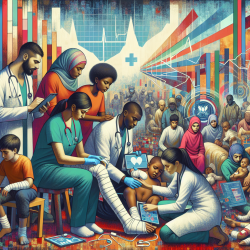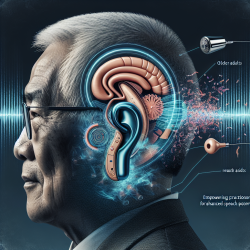As a practitioner focused on data-driven decisions, it's crucial to stay updated with the latest research to improve outcomes for children, especially in conflict zones. The research article "Strengthening the emergency health response to children wounded by explosive weapons in conflict" provides valuable insights and recommendations that can enhance your practice. Here are some key takeaways and how you can implement them.
Key Findings and Recommendations
The study highlights several critical areas for improving the emergency health response to children injured by explosive weapons:
- Injury Epidemiology: Children are more likely to be injured by explosive weapons than adults, often while playing or handling these dangerous items. The study recommends strengthening injury prevention through educational programs and better data collection to understand the epidemiology of these injuries.
- Clinical Considerations: Pediatric knowledge is limited among medical personnel in conflict settings. The study suggests promoting the integration of pediatric modules into standardized trauma training programs and disseminating references such as the Pediatric Blast Injury Field Manual.
- Long-term Sequelae: The long-term effects of explosive weapon-related injuries are profound, requiring a broad range of rehabilitation services. The study recommends improving coordination between acute trauma care and disability services to strengthen referral pathways to rehabilitation services.
Implementing the Findings
Here are some practical steps you can take to implement the study's recommendations:
- Strengthen Injury Prevention: Collaborate with local organizations and schools to educate children and communities about the dangers of explosive weapons. Utilize resources like UNICEF’s International Mine Risk Education Working Group to build ties between medical personnel and explosive ordnance risk education programming.
- Enhance Pediatric Training: Integrate pediatric-specific modules into your existing trauma training programs. Ensure that your team is familiar with age-specific physiological ranges, equipment sizing, and medication dosing. Utilize resources like the Pediatric Blast Injury Field Manual and pediatric vital sign charts.
- Improve Coordination and Referral Pathways: Map out local rehabilitation services and establish strong referral pathways. Ensure that children receive comprehensive care, including physiotherapy, mental health services, and vocational training, to address the long-term effects of their injuries.
Encouraging Further Research
The study also identifies gaps in research, particularly in understanding the epidemiology of explosive weapon-related injuries in children. As practitioners, we can contribute to this field by participating in data collection efforts and supporting research initiatives. Establishing a standardized and cooperative registry for conflict-related injuries among children can help improve our understanding and guide future interventions.
By implementing these recommendations and supporting further research, we can significantly improve the emergency health response for children wounded by explosive weapons in conflict zones, ultimately leading to better outcomes for this vulnerable population.
To read the original research paper, please follow this link: Strengthening the emergency health response to children wounded by explosive weapons in conflict.










